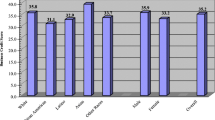Abstract
This paper uses the 1998 and 2003 Surveys of Small Business Finance (SSBF) to detail the recent experiences of black female headed small businesses (BFHBs) in the capital markets. It documents, a large disparity in the importance of a college education for black and non-black female headed businesses (NFHBs); that the race of a female headed business is an important factor in determining whether a loan is approved; and that although receiving a college education does not remove the cost BFHBs face due to their owner’s race, it is significantly lower than that faced by their peers without a college educated owner. Together, this paper provides striking evidence of taste-based and statistical discrimination , both in violation of the Equal Credit Opportunity Act.




Similar content being viewed by others
Notes
2002 Survey of Business Owners (VIA AMERICAN FACTFINDER) “ Sector 00: Survey of Business Owners (SBO): Geographic Area Series: Economy-Wide Estimates of Business Ownership by Gender, Hispanic or Latino Origin, and Race: 2002 ” American FactFinder. Bureau of the Census. Web. 11 July 2011.
2007 Survey of Business Owners (VIA AMERICAN FACTFINDER) “ Sector 00: Survey of Business Owners (SBO): Geographic Area Series: Economy-Wide Estimates of Business Ownership by Gender, Hispanic or Latino Origin, and Race: 2007 ” American FactFinder. Bureau of the Census. Web. 11 July 2011.
The Equal Credit Opportunity Act prohibits creditors from using race when deciding to give a loan.
References
Aigner D, Cain G. Statistical theories of discrimination in labor markets. Ind Labor Relat Rev. 1977;175–87.
Becker, Gary (1971). The Economics of Discrimination (2nd ed). Chicago, The University of Chicago Press.
Blanchflower D, Levine P, Zimmerman D. Discrimination in the small business credit market. Rev Econ Stat. 2003;85(4):930–43.
Cavalluzzo KC, Wolken J. Competition, small business financing, and discrimination: evidence from a new survey. J Bus. 2002;641–79.
Survey of Business Owners (VIA AMERICAN FACTFINDER). Sector 00: Survey of Business Owners (SBO): Geographic Area Series: Economy-Wide Estimates of Business Ownership by Gender, Hispanic or Latino Origin, and Race: 2002. American FactFinder. Bureau of the Census.
Survey of Business Owners (VIA AMERICAN FACTFINDER). Sector 00: Survey of Business Owners (SBO): Geographic Area Series: Economy-Wide Estimates of Business Ownership by Gender, Hispanic or Latino Origin, and Race: 2007. American FactFinder. Bureau of the Census.
Author information
Authors and Affiliations
Corresponding author
Additional information
I would like to thank Omari Swinton, Rhonda Sharpe and seminar participants at Duke, Bennet, Howard and anonymous referees for helpful comments and suggestions. All errors and views are the authors own.
About this article
Cite this article
Gray, J.W. Bi-Polar: College Education and Loans to Small Businesses Headed by Black Females. Rev Black Polit Econ 39, 361–371 (2012). https://doi.org/10.1007/s12114-012-9142-6
Published:
Issue Date:
DOI: https://doi.org/10.1007/s12114-012-9142-6




